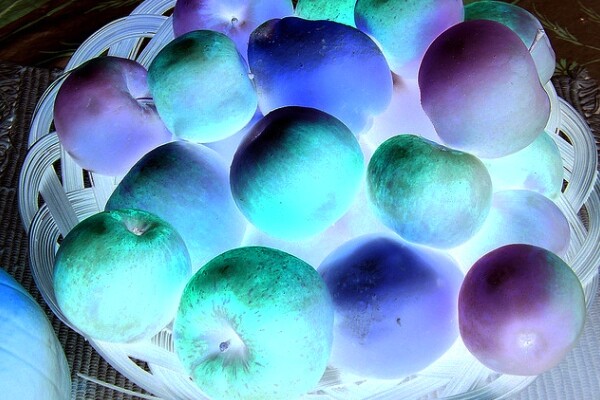An Apple A Day Brings Pesticides Your Way

One of my favorite episodes of "It's Always Sunny in Philadelphia" -- and, honestly, a whole lot of them are tied for first place -- is when two of the show's main characters, roommates Mac and Dennis, decide that they've been spending too much time with one another and need a little "break." The rest of the episode delves into the as-yet unexplored codependent relationship they have, everything from Mac letting Dennis do the talking because he knows "good words" and Dennis refusing to eat an apple that still has its skin on it because Mac says they're "loaded with toxins." (Feel free to watch Dennis's freak-out about 13 seconds into this YouTube clip.) Which is a long way of saying two things: One, seek out this episode and watch it, because it's hilarious. Two, the best comedy comes from truth, and this is no exception.
Apples are, indeed, loaded with toxins. At least, that's what this year's version of the Environmental Working Group's "Shopper's Guide to Pesticides in Produce" says.
Every year, the EWG puts together an analysis determining which types of produce are most likely to contain contamination from pesticides. To do so, they work over some 28,000 samples of the 48 most popular fruits and vegetables, testing them on the following categories: (1) percentage of detectable pesticides; (2) percentage of samples of multiple detectable pesticides; (3) average number of pesticides found in a single sample; (4) amount of all pesticides found; (5) maximum number of pesticides found in a single sample; (6) total pesticides found overall. After that information's compiled, they release the results to the public.
Apples, notoriously bad when it comes to contamination, are indeed on this year's "Dirty Dozen" list, the 12 most-contaminated items. The rest of the list, items that you should pay close attention to when checking them out at the grocery store, are: celery, cherry tomatoes, cucumbers, grapes, hot peppers, imported nectarines, peaches, potatoes, spinach, strawberries, and sweet bell peppers.
(The list isn't all bad news, though. The group also releases the "Clean Fifteen," a list of items that scored the lowest; fruits and veggies you should feel safe shopping for. Among the items on that list: asparagus, eggplant, kiwi, pineapples, and sweet potatoes. So feel free to go nuts with those!)
All of this information is well and good regarding the contaminated products, but how does one use it? The solution is not to just steer completely clear of cucumbers and grapes, or to make sure your roommate peels every apple before you bite into it. And simply washing them doesn't entirely cut it either; most pesticides are too deeply implanted to wash off with just a cursory scrubbing. So, what is there to do?
While limiting your intake of the so-called "Dirty Dozen" is advised -- if you were eating an apple a day because you hate doctors and want them out of your life, well, maybe it's time to eat an apple every other day -- it's also important to make a concerted effort to purchase those 12 items from organic-practice, local farmers who don't utilize pesticides. And while splurging for the organic variety may add an extra chunk of change to your grocery bill, you can take solace in the fact that you don't necessarily have to make the same buying upgrade when it comes to getting the "Clean Fifteen" items. (Plus, when you buy organically-labeled products, you may even trick yourself into believing they taste better.)
The key to avoiding pesticides is the same as it ever was: Go to farmers' markets, talk to local farmers, ask them directly about their usage of pesticides, and get to know their products. To borrow a phrase from Bruce Campbell in "Army of Darkness," shop smart.